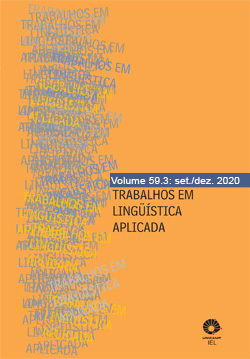Abstract
New statutory Relationships and Sex Education (RSE) guidance for schools in England was published in 2019. One of the major revisions since the preceding version has been the new inclusion of LGBTQ+ identities and relationships. Some groups in the UK have recently protested against this inclusion of positive teaching about LGBTQ+ identities and relationships, suggesting that, although there is overwhelming support for the new guidance, there are still groups in society who are opposed to democratic teaching about this dimension of equality. Focusing on publicly-available video recordings of the protests, this article firstly critically analyses the key discursive strategies deployed by the anti-LGBTQ+ protest groups to produce discrimination and denial. I then compare the language used by the protest groups against the language used by other UK groups who support and continue to campaign for LGBTQ+ inclusion in RSE. Positive discourse analysis, as a progressive dimension of critical discourse analysis, is used to examine how the language used by these groups functions to resist the discriminatory discourse used by the anti-LGBTQ+ groups analysed in the first part of the article. Analysis of the discourse used by the two sets of groups reveals conflicting discourses around what is perceived to constitute ‘democracy’ and ‘equality’ in the context of LGBTQ+ inclusion and schools, suggesting that these are fragile concepts in the current British political climate.
References
BARTLETT, T. (2012). Hybrid Voices and Collaborative Change: Contextualising Positive Discourse Analysis. London: Routledge.
FLOWERDEW, J. (2008). Critical discourse analysis and strategies of resistance. In: Bhatia, V., Flowerdew, J. and Jones, R. (eds.) Advances in Discourse Studies. London: Routledge, p. 195-210.
HUGHES, J. (2018). Progressing Positive Discourse Analysis and/in Critical Discourse Studies: Reconstructing resistance through progressive discourse analysis. Review of Communication. 18, 3, p. 193-211.
JACKSON, J. (2014). Introducing Language and Intercultural Communication. London: Routledge.
LUKE, A. (2002). Beyond science and ideology critique: Developments in critical discourse analysis. Annual Review of Applied Linguistics. 22, p. 96-110.
MACGILCHRIST, F. (2007). Positive discourse analysis: Contesting dominant discourses by reframing the issues. Critical Approaches to Discourse Analysis Across Disciplines. 1, 1, p. 74-94.
MARLOW, M. (2015). The American Dream? Anti-immigrant discourse bubbling up from the Coca-Cola ‘It’s Beautiful’ advertisement. Discourse and Communication. 9, 6, p. 625-641.
MARTIN, J.R. (2004). Positive discourse analysis: Solidarity and change. Revista Canaria de Estudios Ingleses. 49, p. 179-202.
MARTIN, J.R. (1999). Grace: The logogenesis of freedom. Discourse Studies. 1, 1, p. 29-56.
NARTEY, M.; ERNANDA (2020). Formulating emancipatory discourses and reconstructing resistance: a positive discourse analysis of Sukarno’s speech at the first Afro-Asian conference. Critical Discourse Studies. 17, 1, p. 22-38.
ROGERS, R.; MOSLEY WETZEL, M. (2013). Studying agency in literacy teacher education: A layered approach to positive discourse analysis. Critical Inquiry in Language Studies. 10, 1, p. 62-92.
Sauntson, H. (2018). Language, Sexuality and Education. Cambridge: Cambridge University Press.
Sauntson, H. and Borba, R. (In press) Silence and sexuality in school settings: A transnational perspective. In J. Stern, M. Walejko, C. Sink and W. Ping Ho (eds) The Bloomsbury Handbook of Solitude, Silence and Loneliness. London: Bloomsbury.
STIBBE, A. (2017). Positive discourse analysis: Re-thinking human ecological relationships. In: Fill, A. and Penz, H. (eds.) The Routledge Handbook of Ecolinguistics. London: Routledge.
VAN DIJK, T. (2006). Discourse and manipulation. Discourse and Society. 17, 3, p. 359–383.
VAN DIJK, T. (2001). Multidisciplinary CDA: A plea for diversity. In: Wodak, R. and Meyer, M. (eds) Methods of Critical Discourse Analysis. London: Sage, p. 95-120.
VAN DIJK, T. (1992). Discourse and the denial of racism. Discourse and Society. 3, 1, p. 87-118.
WODAK, R.; MEYER, M. (eds) (2009). Methods of Critical Discourse Analysis (2nd edition). London: Sage.

This work is licensed under a Creative Commons Attribution 4.0 International License.
Copyright (c) 2021 Trabalhos em Linguística Aplicada


